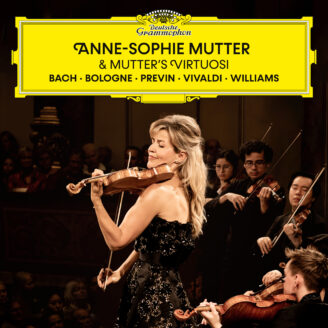Leonard Bernstein achieved his unprecedented popularity primarily through his numerous performances as a conductor in concert halls and television studios all over the world. He studied music, philosophy, and literature at Harvard University. At the Curtis Institute of Music he studied movement and instrumentation, piano, and conducting. In addition, he studied composition with Aaron Copland and attended conducting courses given by Sergei Kussewitzky at the Berkshire Music Center. He made his conducting debut in 1943, leading the New York Philharmonic Orchestra in place of the indisposed Brunno Walter. The concert was broadcast throughout the country. During the next year he completed his first symphony Jeremiah and the musical On the Town.
His many instrumental, vocal and theatrical works, various publications in music journals, and international appearances paved his way to stardom.
Leonard Bernstein wrote the following about his Serenade: "There is no comprehensive explanation for how this serenade came about except to say that my repeated reading of Plato's wonderful dialog Symposium stimulated me to compose it. As the dialog, the music consists of a series of related expressions which glorify love. It also formally follows the sequence of speakers at a banquet as indicated by Plato. The relationship of the movements is not based on common thematic material in the normal sense but rather on a system in which every movement is developed from elements of the previous movement. I would like to refer listeners interested in the literary allusions to the following points:
Phaidros: Pausanias (lento, allegro). Phaidros opens the Symposium with an enthusiastic hymn to Eros, the god of love (a fugato begun by the solo violin). Pausanias begins to speak, talking of the duality of loving and being loved. This is expressed in a classical allegro sonata movement, which is based on the material of the opening fugato.
Aristophanes (allegretto). Aristophanes does not play the role of a jester in this dialog, but rather that of a bedtime storyteller who makes a speech about the mythical fairy tale quality of love.
Eryximachos (Presto). The physician Eryximachos calls physical harmony a natural model for the various forms of love and its effects. This is an extremely short fugato scherzo originating from a mixture of puzzlement and humor.
Agathon (Adagio). This is perhaps most moving speech of the dialog. Agathon extensively praises all aspects of the power of love, its charm and its effect. The movement corresponds to a simple three-part lyrical form.
Socrates: Alkibiades (molto renuto, allegro molto vivace). Socrates tells of his visit with the prophetess, Diotima, and quotes her speech about the demonic nature of love. This slow introduction has a greater weight than each of the preceding movements. It functions as a strongly developed reprise of the middle part of the Agathon movement and creates the impression of a hidden sonata. The famous interruption of the banquet by Alkibiades and his drinking mates introduces the allegro - a highly tense rondo which, in its alternating mood, conveys excitement, jig-like dance music, and festive merriment. If there is a recognizable hint of jazz in this fest, it will hopefully not be understood as anachronistic Greek party music, but rather as the natural mode of expression of a contemporary American composer, who is filled with the spirit of a timeless soirée."
Leornard Bernstein from the original LP cover

